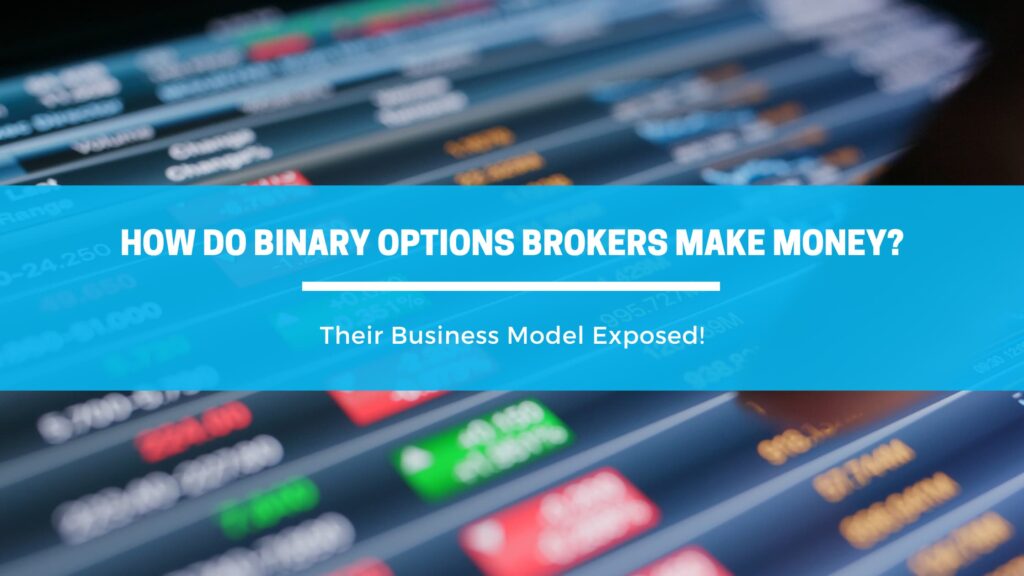Binary options are a popular way for brokers to make good money. It has to do with their versatility and risks.
This impacts the investments and liquidity structure and allows investors to make money.
Brokers facilitate trades and make money whether the investor makes money or not.
How Binary Options Work
Binary options trading platforms function on a simple rule – the broker earns regardless, and the trader earns if they are right. In the USA, trading is usually done on exchanges where traders can buy underlying securities at strike prices.
They gain if they correctly manage to predict how these securities will change according to market fluctuations. If not, they suffer a loss.
Brokers typically want new traders to enter the market – and they want them to lose more than they win. This is because if traders keep making correct guesses, brokers will eventually have to close up shop.
How Do Binary Options Brokers Make Money?
Most binary options brokers make their money when you lose yours. The commission is also a common form of payment for binary brokers – especially if the trading is not happening on an exchange but between two individuals.
Legitimate, regulated brokers mark up the asset price on the platform. The prices of different assets come from the one providing liquidity – and the asset price is always a bit higher than its market variant.
Binary options broker win either way. They get a slice of the profits if you make the right trade. If you make the right guess, you retain the initial investment. However, the broker gets that instead – on top of the payout rate.
If you invested $100, and the payout rate was 65% – assuming your guess was wrong and you lost money, the broker would make $100.
Some other ways a binary options trader can make money are:
Trader's Prediction
There are two outcomes here.
If the trader suffers losses, the broker enjoys profits – and vice versa.
The prediction a trader makes will heavily impact whether or not they make any kind of profit. If trading charts behave differently by the expiration date, you might suffer a loss. Understanding the investment process is key.
Traders also do not get compensated for any losses they incur while trading.
Trader to Trader
A popular method – this involves trades between two traders instead of on the open market. It does follow the same concept; if one trader makes the wrong guess on an underlying asset – the other makes money.
As a commission, the involved broker charges a variable percentage. This might be fixed.

How Do Scam Brokers Make Money?
Scam brokers capitalize on the lack of information that beginners to trading are prone to. They offer very lucrative returns, but there will be very little transparency. An honest broker makes it a point to be very transparent.
They can also offer fake numbers and returns to create a good impression; however, traders usually end up empty-handed. An excellent way to know if it is a scam is if it sounds too good to be true; binary trading can be simple but requires intelligent guessing.
Binary Options Trading: How Does It All Work?
Options trading lets you buy or sell options contracts, but risks can vary depending on their performance.
Essentially, it boils down to predicting a given stock's performance and the variables that affect it.
Binary Options contracts are agreements.
These allow you to buy or sell basic securities at fixed prices. Owners, however, can choose whether or not to own a security if they want to sell or purchase options.
Options trading involves a holder and a seller – the seller or “writer” creates these contracts, whereas the holder pays top dollar for selling/purchasing rights by fixed dates. Fundamental types of contracts are:
Calls: These give you the right to buy any underlying security.
Puts: These give you the freedom to sell the shares of any underlying security.
There are differences between the two, but accurately predicting price fluctuations in both can help turn over a good profit.
In terms of financial risk, the seller has unlimited risk with call options, whereas the buyer's risk is limited. In put options, the seller has limited financial responsibility, equal to the price they bought it at and the shares involved.
The price the holder pays is the collateral they lose should the contract expire without profit.
Binary trading is different from traditional trading. It requires predicting the market movement to some extent. It is typically the most efficient when it comes to short-term trading.
Options trading has also become much more popular across multiple global markets – the Options Clearing Corp states that 939 million contracts were traded in 2022. This is a 4.5% increase from 2021.
Types of Trading Binary Options Brokers
There are two types: these are regulated brokers and unregulated brokers.
They both make their money differently, but the former has certified regulations from a financial industry regulatory authority.
Regulations work differently in each country. Not every broker is regulated, and not every unregulated broker is a scam broker. Reputable, efficient brokers can be without regulation – this does not mean you should not trust them.
A broker might also have the necessary MIFID and CySEC authorizations to operate in the E.U. but might need to go through the NFA process if they wish to trade in the U.S.
Foreign vs. U.S. Binary Options
There are a few differences if you trade binary options outside the USA. While lucrative, it requires understanding market fluctuations, liquidity structures, price fluctuations, risks, and fees – as these variables affect the global binary market.
In the USA, trades are made via the exchange. This exchange takes a fee, and the entire process is subject to evaluation. Trades are always eligible, and the rates stay between 1-100.
The critical difference is that trades have fixed strike prices and payouts outside the USA. This reduces the financial risk, which is reassuring but also damages profitability.
There is also the lack of an exchange system; outside of the USA, individual traders offer binary options to interested buyers. They make their profit from the differences in the trades they handle.
US traders tend to trade in high to low binary options, but outside that, there is variation. One kind of foreign option is a “one touch.” In this situation, an option must hit the strike price before it expires.
Range options are another kind. In this scenario, buyers can select prices anywhere within a specific range. The instrument they purchase only has to stay in that range until the expiration date for a chance for a good profit.
Liquidity is a non-factor outside of the USA. Since traders do not own the underlying assets, they can work with various prices and dates (usually set by the broker).
To successfully enter foreign markets, traders must understand the possible outcomes – they will have rewards and risks, but the risk is often higher than the reward. There is also the risk of unregulated brokers, so it is a good idea to survey potential markets before investing.
Final Thoughts
Getting into binary options trading can be very confusing. People eager to make a profit can easily end up playing into a broker's effective business model.
This type of trading rewards patient traders who take their time to study, learn the market, and make smart investments with all the risks in mind. Yet, for a broker to flourish – it is in their best interest to constantly keep new people coming into the trading scene.
This is one of many complexities involved in binary options trading, but for those who develop a feel for how the market moves, there is good money to be made – and it can all be done with some start-up capital and well-thought-out predictions and decisions.

